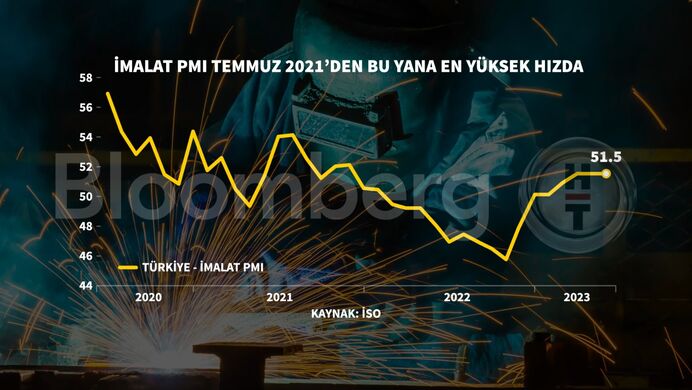Manufacturing PMI at highest pace since July 2021

The results of the Istanbul Chamber of Industry (ISO) Turkey Manufacturing PMI (Purchasing Managers Index) survey for the period of June 2023, which is considered the fastest and most reliable reference in the performance of the manufacturing industry, which is the leading indicator of economic growth, have been announced. According to the survey results, in which all figures measured above the threshold value of 50.0 indicate an improvement in the sector, the headline PMI was realized as 51.5 for the third month in a row in June, indicating that the moderate improvement in the manufacturing sector continues. Thus, operating conditions have strengthened over the last six months.
The positive development that stood out in the last survey was the strong increase in manufacturing industry production and the acceleration of this increase compared to the previous month. Growth, which has reached the fourth month as the trend, was also measured at its fastest pace since July 2021. Firms stated that in addition to the improvement in demand, the continued recovery after the earthquake and the recovery in economic activity after the election period were also effective in the increase in production.
Increase in input prices accelerated
While new orders increased for the fourth month in a row, the increase in June was moderate and recorded at the lowest rate of the current expansion period. Survey participants pointed out that the depreciation in the lira was partially effective in the said slowdown.
The increases in input costs and final product prices, which had slowed down in the previous months, gained momentum again in June due to the fluctuations in the exchange rate. While the fastest increase in input prices in nearly a year took place, final product prices increased at the highest rate since February.
On the other hand, suppliers’ delivery times were noticeably longer due to difficulties in responding to high input demand. Accordingly, the use of existing stocks by companies led to a decrease in input stocks.
Employment increased two months in a row
Along with the improvement in production, employment increased for the second month in a row. Although the increase in question was at a moderate level, it was recorded at a slightly higher rate compared to May. Despite this, backlogs increased for the second time in the last three months.
Commenting on the Istanbul Chamber of Industry Turkey Manufacturing PMI survey data, Andrew Harker, Economy Director of S&P Global Market Intelligence, said:
“Manufacturing industry production showed a strong performance in June and the first half of the year was completed with a mostly positive outlook in the sector due to the continued improvement in demand conditions. On the other hand, the depreciation in the lira was a compelling factor for companies, both limiting the increase in new orders and halting the recent easing in inflationary pressures. A relatively positive development was that manufacturers continued to expand their employment and purchasing activities. This indicates that manufacturers maintain optimism in their expectations for the second half of the year.”
Inflationary pressures strengthened across the manufacturing industry
According to the Istanbul Chamber of Industry Turkey Sectoral PMI June report, inflationary pressures have strengthened throughout the manufacturing industry due to the depreciation of the lira last month. The increase in new orders in only three of the 10 sectors followed pointed out that increasing inflationary pressures also affected demand in some sectors. Some sectors, especially machinery and metal products, realized strong production increases. While production expanded in four sectors in total, a horizontal course was observed in land and sea vehicles compared to May. Thus, production slowed down in half of the sectors followed.
New orders improved in all but one of the sectors that increased their production in June. The only exception to this trend was textile products, where orders slowed down slightly. The fastest increase in new orders was in food products, while the most significant slowdown was in the clothing and leather products sector. The outlook for total new orders was more positive compared to new export orders.
Due to the weak foreign demand conditions, only two of the 10 sectors followed grew in exports.
Input costs inflation increased across sectors. While the most obvious acceleration in inflation was in the chemicals, plastics and rubber sectors, the sharpest increase in costs was recorded in machinery and metal products. Machinery and metal products were the sector with the fastest increase in sales prices at the end of the second quarter. As a reflection of the developments in input costs, inflation in final product prices also increased widely. The slowest increase in selling prices was measured in non-metallic mineral products.
While employment growth was seen in half of the sectors followed, the strongest increase was in chemical, plastic and rubber products. The sector that decreased the employment level the most was clothing and leather products, where new orders slowed down. Purchasing activity showed varying trends across sectors. Input purchases accelerated in half of the 10 sectors followed, while decelerated in the other half. Supplier lead times increased in the majority of industries. The longest delays in deliveries were observed for machinery and metal products.





